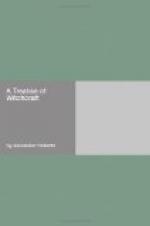[oo]_Hippocrates_ doth almost like a Christian discourse
of this poynt, and condemne the whole practise of
this Art, as iniurious vnto God, who onely purgeth
sinnes, and is our preseruer; and for these fellowes
who make profession of such wonder-working, brandeth
them for Impostors and deceiuers. I conclude
with that remarkeable saying of an ancient Diuine;[pp]
These vanities doe separate and with-draw vs from God,
though they may seeme to haue something in them to
allure and delight vs; yet let no Christian entertaine
them, whose hope ought to be setled in God alone.
And if thou be in distresse, or afflicted with sicknesse
of body, and feele no present release or comfort, what
then? here is the tryall of thy patience, haue not
recourse to superstitious and vnlawfull helpers, although
they promise thee present remedy; and when they fore-tell
thee of things which doe truely according to the prediction
to fall out, beleeue them not, follow the example
of Christ, who rebuked the Diuell, though he called
him (as he was indeed) the Son of God. For vnder
the vaile of truth he shadoweth falshood; euen as if
one should sweeten with honey or sugar the brimme
of the Cup wherein he bringeth poyson: But some
will say, they call vpon the name of the Lord of Sabbaoth.
Well, but this title they giue not to God, but to the
Diuell: therefore betake thou thy selfe to God
alone, craue health at his hand, and follow the Apostles
direction;
If any bee sicke among you, let him
call for the Elders of the Church, and let him pray,
Iames 5. 14.
[Footnote mm: Cato
de re rustica, cap. 5.]
[Footnote nn: Columella
lib. 1. cap. 8.]
[Footnote oo: Libro de morbo
sacro (siue illius sit, siue alterius, nam de
authore apud eruditos dubitatio est) statim ab initio.
& quaeda huc pertinentiae habet Theophrastus de plantis
lib. 9. cap. 21.]
[Footnote pp: Procopius
Gazeus in Leuiticum.]
The ninth Proposition,
and second Corrolary.
There hath alwayes beene some wanton, or peruerse
wits, who only to make triall of their skill, would
take in hand to defend absurd positions, and commend
both such things and persons, which were infamous,
and contemptible as [a]_Phauorinus_ writ the praise
of the Quartane Ague, one of the gout, blindnesse,
and deafness, [b]_Lucian_ of a flye, [c]_Erasmus_
of folly, [d]_Synesius_ of baldnesse, [e]_Glaucus_
in Plato of iniustice. And among the exercises
of the [f]ancient Orators, wee finde those who strained
all their vnderstanding to blaze the honour of that
witlesse and deformed Coward Thersites.
And this they haue performed with great Art and eloquence,
onely to shew their faculty, but neuer in good earnest
took such a matter in hand. And therefore more
deeply is hee to be censured, who hath made himselfe
an aduocate to plead the cause of [g]Witches, and
defend th[e] as innocent. And because this




